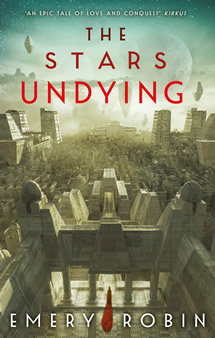Reviewed by Robert Goodman.
By Emery Robin, Hachette, $22.99.
 Ever since the earliest empire-based space operas, science fiction authors have been drawing on the traditions of the great Wester Empires – Greece and Rome. Even now, many space operas that are geared around the concept of empire often have a retro feel. Emery Robin takes this a step further in her debut The Stars Undying by basing the plot sqaurely around the story of Julius Caesar, Cleopatra and Mark Anthony. This essentially space-based retelling is both a strength and a weakness of the book.
Ever since the earliest empire-based space operas, science fiction authors have been drawing on the traditions of the great Wester Empires – Greece and Rome. Even now, many space operas that are geared around the concept of empire often have a retro feel. Emery Robin takes this a step further in her debut The Stars Undying by basing the plot sqaurely around the story of Julius Caesar, Cleopatra and Mark Anthony. This essentially space-based retelling is both a strength and a weakness of the book.
When The Stars Undying opens Altagracia Caviro Patramata, also known as Gracia, is on the run. Her twin sister Alecia has taken the throne of Szayet that Gazia believed rightfully hers and along with it the Pearl of the Undying which contains an artificially intelligent version of Aleksa, conqueror of their world three hundred years before. But Szayet is a client plant of the much larger Ceian Empire, and when the Ceian commander Matheus Ceiran turns up, Gracia finds a way to get to him and turn him to her side to her benefit. Their relationship and its repercussions will start to reshape the Empire.
For those following along at home Aleksa is Alexander the Great, Gracia is Cleopatra, Cerian is Ceasar and his right hand woman Anita is a gender flipped Marc Anthony. For those who don’t know the story (or what ultimately happens to Caesar when he pushes his power too far) there may be some surprised in the overall plot. But even for those who do, Robin’s adherence to the actual politics of the ancient world makes for fairly tedious reading. The relationship between the two leads feels a little perfunctory and the political manoeuvring is both complex and lifeless.
The Stars Undying takes the idea of a galactic empire and tries to impose ancient rules on it to only limited success. It requires whole planets to be defined by a single city or place, it is full of arcane politics that possible make sense only for those who are across the real historical politics that it is based on and it is centred around an unengaging and unearned love story (again based on a real one that may well have had some actual fire to it). Plenty of authors are reinventing Greek and Roman mythology and Shakespearean stories at the moment without necessarily taking them to space. This is an example where the change in context does neither the original story nor the retelling any favours.
Over 900 more book reviews can be found on Pile by the Bed.











